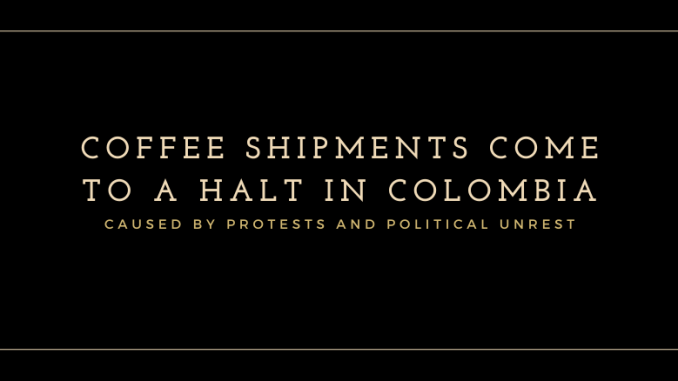
As protests in Colombia continue, the country is experiencing a halt in coffee shipments.
BY EMILY JOY MENESES
SPECIAL TO BARISTA MAGAZINE ONLINE
Over the past several weeks, Colombia has erupted in national strikes, with demonstrators expressing anger over political corruption, income inequality, police brutality, and a proposed plan to raise taxes on essentials like water, gas, electricity, gasoline, food, and more: a bill that would primarily impact Colombia’s working and middle classes. (As of May 17, the tax reform has been mostly repealed, but protests continue.)
Currently, Colombia is experiencing the worst economic recession it has seen within the past half-century, with its GDP dropping nearly 7% in 2020. Though Colombian President Iván Duque and his administration have since withdrawn the unpopular clauses of the proposed tax reform bill, the protests are continuing, with citizens expressing frustration over the country’s overall economic state and the way their government has handled the COVID-19 pandemic.
We express our concern for the Colombian people, and today, we’re uncovering how the country’s current crisis is impacting coffee shipments.
Claudia Rocio Gomez, Sustainable Harvest’s Colombia supply manager, shared her insights on the matter, revealing that the most affected regions at the moment are Cali (Valle del Cauca), Medellin, Antioquia, Bogota, and Huila—most of which have a strong coffee-producing role in the global coffee supply chain. Over the past several weeks, protestors have been setting up road blockades around the country, resulting in a halt in coffee shipments.
“For now, the Buenaventura port is the most affected by the protests and strikes,” Claudia shares. “The Cartagena and Santa Marta ports have been a bit less affected—but it’s worth noting that the problem isn’t the ports themselves, but rather, the access roads to the ports.
“Even with the ports working normally, (it’s been difficult) getting coffee and other products there due to roadblocks,” Claudia continues. “… It’s expected that shipments will suffer delays out of Colombia even after the unrest has subsided, as the ports will have to deal with a backlog of inbound and outbound traffic.”
According to Cafe Imports, with most coffee producers unable to reach purchasing points to deliver and sell their coffees, the shipment of coffee from purchasing points to dry mills is currently at a standstill. Cafe Imports also reported that because no goods can be exported, bookings with shipping lines are being rolled to June—which means high congestion and scarcity of available bookings. The industry can expect a three- to four-week minimum delay in Colombian coffee shipments, and in the meantime, we are continuing to track the situation and will follow up with any updates.
As many coffee people know, coffee shipments travel by sea, and this isn’t the first incident of delayed shipments in the green exporting system over the past year. Earlier this season, Europe experienced a delay in coffee shipments from East Africa and Asia because of a six-day blockage at the Suez Canal.

ABOUT THE AUTHOR
Based in Los Angeles, Emily Joy Meneses (she/her) is a writer and musician passionate about culture and collective care. You can regularly find her at Echo Park Lake, drinking a cortado and journaling about astrology, art, Animal Crossing, and her dreams. Explore her poetry, short stories, and soundscapes on her website.

